What is the History of Communion in Church?
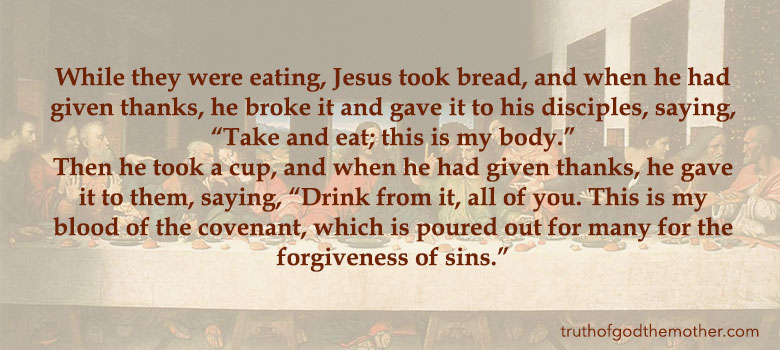
This verse means different things to different people. To mainstream Christians and Catholics, this is the origin of communion, or eucharist. The way they remember Christ four times a year, every Sunday or even every day. But to the members of the World Mission Society Church of God, this is God’s ultimate love – the Passover of the New Covenant. And the Passover is a holy feast of God celebrated only once a year. So where does the distinction come from? What is the history of communion?
God first commanded his people to celebrate the Passover 3500 years ago. On the fourteenth day of the first month of Nisan, the Israelites (who were enslaved in Egypt at the time) were to take a lamb, slaughter it, and place its blood on the doorframe of their homes. This blood was the sign they were God’s people. And because of this blood, they were saved from the plague of the firstborn. It was through the Passover that God freed the Israelites from the slavery of Pharaoh. Throughout the Old Testament, we can see all the people of God continually celebrate the Passover as a feast God commanded.
Exodus 12:6 “Take special care of this chosen animal until the evening of the fourteenth day of this first month. Then the whole assembly of the community of Israel must slaughter their lamb or young goat at twilight. (v.11) …Eat the meal with urgency, for this is the Lord’s Passover. (v.14) This is a day to remember. Each year, from generation to generation, you must celebrate it as a special festival to the Lord.”
Two thousand years ago, Jesus too commanded His disciples to prepare the Passover. Instead of slaughtering a lamb, Jesus established the Passover of the New Covenant, celebrating the feast with bread and wine.
Luke 22:14 When the time came, Jesus and the apostles sat down at the table. Jesus said, “I have been eager to eat this Passover meal with you before my suffering begins.”
This is the same scene of Matthew 26 and it also appears in the other books of the gospel – Mark and John.
The disciples celebrated the Passover with Jesus Christ the night before He was crucified and continued to celebrate the Passover even after Christ’s ascension. The Early Church understood this feast is the core of Christianity and the core of the Scriptures.
1 Corinthians 11:23 For I pass on to you what I received from the Lord himself. On the night when he was betrayed, the Lord Jesus took some bread and gave thanks to God for it. Then he broke it in pieces and said, “This is my body, which is given for you. Do this to remember me.” In the same way, he took the cup of wine after supper, saying, “This cup is the new covenant between God and his people – an agreement confirmed with my blood. Do this to remember me as often as you drink it.”
But all the disciples died, the church slowly began to experience changes. The Church in Rome began to exercise more power as more middle class and nobles began to attend the church.
In AD 155, a controversy arose between the Church in Rome and the Church in Smyrna. Bishop Polycarm, the leader of the Church in Smyrna, was taught directly by Apostle John, one of the twelve disciples who walked with Christ. He continued keeping the teachings handed down to him from Christ. He celebrated the Passover at the appointed time on the 14th day of the month of Nisan. The Church in Rome was combining the celebration of the Passover and the Day of Resurrection as one feast, celebrating it on Sunday.
Then again in AD 197, Bishop Victor of the Church in Rome influenced the western churches to celebrate the Passover on the first Sunday following the Passover, not on the 14th day of the month. Bishop Polycrates of Ephesus, however, insisted they keep the teachings as they had received them from Christ.
As a result, Victor tried to excommunicate the Asian churches claiming they were being “unorthodox,” but did not succeed.
Roman Emperor Constantine, though a high priest in paganism, treated Christianity as a favored religion. He granted immunities to the clergy and lavished gifts on the church. He even spoke as if he were a Christian himself. But Constantine promoted the ecumenical “One World Religion,” or “Universal Church,” where both pagan and Christians would worship together. (The History of Christianity)
So he started by changing the day of worship. Even though they had been observing the Sabbath day for centuries, just as Christ taught, the Church in Rome and nearby churches accepted Sunday as the day of worship. But Sunday was the day when pagans worshipped the sun god. Like this, Constantine’s plan of creating a universal religion succeeded and both Christians and pagans could worship on the same day – together.
Changing the day of worship wasn’t enough. Christians in the Churches in Asia were still celebrating the Passover, as God commanded, on the 14th day of the month of Nisan. This was the same date the Jewish celebrated the Passover. And the Church in Rome wanted to differentiate itself from the Jews. So Constantine held the First Council of Nicea in Asia Minor in AD 325 to finally “settle the dispute” between the Christian churches. As a result, the Day of Resurrection was named “Easter” after the pagan goddess of spring and fertility, Eostre. And it was to be celebrated the Sunday following the full moon or after the Spring equinox.
They got rid of the Passover and combined the feast with the Day of Resurrection and would only celebrate Easter. Any Christian who was still celebrating the Passover was now branded and punished as a heretic. Then in 341, they were excommunicated.
So what is Matthew 26:26 really about? It’s about the Feast of the Passover of the New Covenant, which is to be celebrated on the 14th day of the first month in the sacred calendar. It is not Easter and definitely not communion. Christ set the example for us to celebrate the Passover as the feast that grants us eternal life.
Matthew 26:26 was one of the few verses I knew growing up. As you might know, I grew up Catholic. I always recognized it because it was the only verse that was read in mass. It was used right before the communion was handed out to congregants. Communion is not biblical. The Roman Catholic Church became completely secularized and adopted the teachings of paganism and from its leaders.
After some time, they began to celebrate this “holy supper” at different times and not just once a year under the pretext that the apostles said we could break bread whenever.
1 Corinthians 11:26 For whenever you eat this bread and drink this cup, you proclaim the Lord’s death until he comes.
Today, the Roman Catholic Church celebrates this communion (or eucharist) whenever they please – every day, every Sunday, during worship service, at weddings and, from personal experience, even at funerals. Jesus Christ was eager to celebrate the Feast of the Passover with His disciples before His death but He waited until the appointed time to do so. How important must the time of the Passover be? It’s unfortunate that church leaders nowadays twist the teachings of God and have devalued this important feast of God.
Numbers 9:13 “But those who neglect to celebrate the Passover at the regular time, even though they are ceremonially clean and not away on a trip, will be cut off from the community of Israel. If they fail to present the Lord’s offering at the proper time, they will suffer the consequences of their guilt.”
So it’s up to you whether you want to neglect eating the bread and drinking the cup of the Lord at the proper time out of convenience or because of tradition. God gave us the Bible so that we know His teachings and can receive blessings and eternal life from God. Jesus Christ taught us to eat His body and drink His blood at the New Covenant Passover once a year – the 14th day of the month of Nisan. The World Mission Society Church of God is the only church I’ve found that celebrates the Passover the same way that Jesus Christ did 2,000 years ago.
I leave you with this…
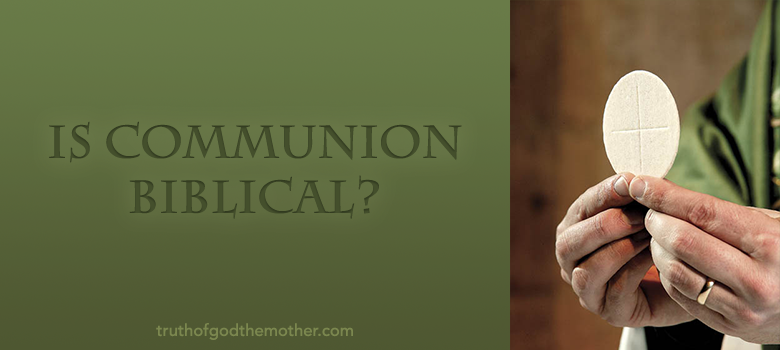
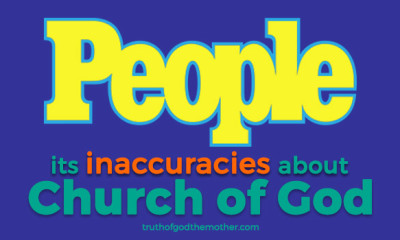
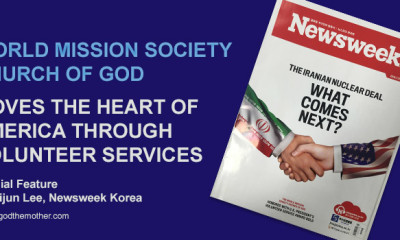
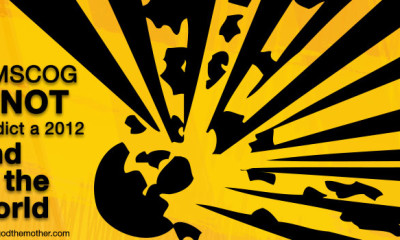
What is not from the Bible does nothing for our salvation at all! We should not wander between the Communion and the Passover of the new covenant at all!
Thank you for this information.
After reading this article it’s clear to see that Communion did not come from God. All Christians must know the truth of the Passover that Jesus gave us.
We can not allow ourselves to be lied to any longer or continue to follow anything contrary to the teachings of God.